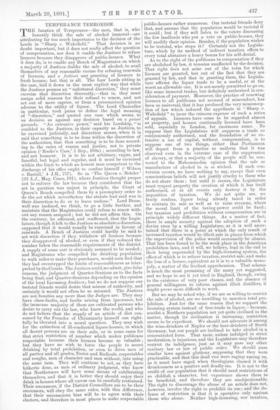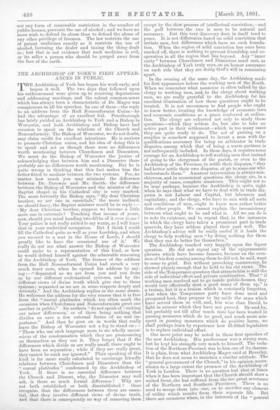TEMPERANCE TERRORISM. T HE fanatics of Temperance—the men, that is, who
honestly think the sale of alcohol immoral—are attributing far too much importance to the decision of the Lords in " Sharp v. Wakefield." That decision is no doubt important, but it does not really affect the question of compensation, nor does it enable the Justices to refuse licences because they disapprove of public-houses. What it does do, is to enable any Bench of Magistrates on which a majority of Justices dislike the sale of alcohol, to avail themselves of any reasonable excuse for refusing renewals of licences, and a fortiori any granting of licences to fresh houses; but that is all. The Law Lords sitting in the case, laid it down in the most explicit way that while the Justices possess an " unfettered discretion," they must exercise that discretion discreetly,—that is, they must assign solid reasons for their refusal to renew, and not act out of mere caprice, or from a preconceived opinion adverse to the utility of liquor. The Lord Chancellor in particular, took pains to define the legal meaning of " discretion," and quoted one case which seems to us decisive as against any decision based on a priori grounds. " An extensive power," said his Lordship, " is confided to the Justices, in their capacity as Justices, to be exercised judicially, and discretion means, when it is said that something is to be done within the discretion of the authorities, that that something is to be done accord- ing to the rules of reason and justice, not to private opinion (' Rooke's Case,' 5 Rep., 100a) ; according to law, and not humour. It is to be not arbitrary, vague, and fanciful, but legal and regular, and it must be exercised within the limit to which an honest man competent to the discharge of his office ought to confine himself (' Wilson v. Rasta,' 4 J.R., 757). So in The Queen v. Boteler ' (33 L.J., Mag. Cases, 101), where Justices thought proper not to enforce the law because they considered that the act in question was unjust in principle, the Court of Queen's Bench compelled them by a peremptory order to do the act which nevertheless the statute had said was in their discretion to do or to leave undone." Lord Bram- well was inclined, we think, to go a little further, and maintain that the Magistrates could refuse to renew with- out any reason assigned ; but he did not affirm this. On the contrary, he affirmed, and reaffirmed, that the Legis- lature, though it left to the Justices so absolute a discretion, supposed that it would usually be exercised in favour of renewals. A Bench of Justices could hardly be said to act with discretion if they withdrew all licences because they disapproved of alcohol, or even if they reduced the number below the reasonable requirements of the district. A supply of some sort is obviously assumed to be needed ; and Magistrates who compelled the drinking population to walk miles to make their purchases, would soon find that they had overstepped the limits of reasonableness as inter- preted by the Courts. The Justices could,we admit, give false reasons, the judgment of Quarter-Sessions as to the facts being final, and Quarter-Sessions depending on the opinion of the local Licensing Justices ; but we do not suppose our teetotal friends would desire that misuse of authority, and certainly it would not often be so misused. The Justices are not fanatics any more than the Judges are. They may have class-faults, and faults arising from ignorance, but the immense majority of them are cultivated persons who desire to carry out the law, who know the world, and who do not believe that the supply of an article of diet con- sumed by the Founder of Christianity himself can right- fully be elevated into a moral question. They may wish for the extinction of ill-conducted liquor-houses, in which all decent persons are on their side, or in some cases for that strict restriction of number which makes publicans respectable because their licences become so valuable ; but they have no wish to force the people to secret drinking by total prohibition, or even to drive men of all parties and all grades, Tories and Radicals, respectables and roughs, men of character and men without, into using the same inns. They will continue to act, as they have hitherto done, as men of ordinary judgment, who know that Northerners will have some means of exhilarating themselves, and that it is better they should enjoy their drink in houses where all excess can be carefully restrained. Their successors, if the District Councillors are to be their successors, will obey the same rules, with this difference, that their unconscious bias will be to agree with their electors, and therefore in most places to make respectable public-houses rather numerous. Our teetotal friends deny that, and assume that the population would be teetotal if it could ; but if they will listen to the voters discussing the few landlords who put a veto on public-houses, they will modify their opinion. Besides, if the population wishes to be teetotal, who stops it ? Certainly not the Legisla- ture, which by its method of indirect taxation offers to every total abstainer a heavy bonus for his self-denial. As to the right of the publicans to compensation if they are abolished by law, it remains unaffected by the decision. That right does not arise out of the term for which licences are granted, but out of the fact that they are granted by law, and that in granting them, the Legisla- ture affirms the liquor trade to be a useful, or at the worst an allowable one. It is not merely permitted to go on, like some immoral trades, but definitely authorised in con- sideration of payment. Moreover, the practice of renewing licences to all publicans not accused of misconduct, has been so universal, that it has produced the very misconcep- tion of law which induced the appellants in " Sharp v. Wakefield" to incur the ruinous expense of such a series of appeals. Licences have come to be regarded almost as property, and houses continually licensed have been sold, especially in London, for enormous sums. To suppose that the Legislature will suppress a trade so continuously authorised, and the foundation of so ex- tensive a use of capital, without compensation, is to suppose one of two things, either that Parliament will depart from a practice so uniform that it was observed even in the extreme case of the suppression of slavery, or that a majority of the people will be con- verted to the Mahommedan opinion that the sale or manufacture of alcohol in in se wicked. If such con- version occurs, we have nothing to say, except that even conscientious beliefs will not justify cruelty to those who do not share them ; but until it occurs, the Legislature must respect property the creation of which it has itself authorised, or at all events only destroy it by the imposition of taxation. We do not quite see, we freely confess, liquor being already taxed in order to restrain its sale as well as to raise revenue, where the moral limit of the taxing-power could be fixed ; but taxation and prohibition without compensation are in principle widely different things. As a matter of fact, there is ample security against the adoption of such a device even by a willing Legislature, as it is well ascer- tained that there is a, point at which the only result of increased taxation would be illicit sale in places from which the supervision of the police would necessarily be absent. That has been found to be the weak place in the American prohibition laws, and it will, we believe, lead in the end to their being superseded by the high-licensing system, the effect of which is to relieve taxation, restrict sale, and make the loss of a licence, equivalent as it is to a valuable mono- poly, a matter of the liveliest apprehension. That scheme is much the most promising of the many yet suggested, and we hope to see it yet tried in England, though, owing to the existence of very poor classes, and the absence of general willingness to inform against illicit distillers, it might prove more difficult to work.
But we may be asked why, if we are so willing to restrict the sale of alcohol, are we unwilling to sanction total pro- hibition. Just for the same reason that we support the licensing system instead of free-trade in liquor,—because, amidst a Northern population not yet quite civilised in the matter, though its civilisation is increasing, restriction seems to be expedient. We should not advocate it among the wine-drinkers of Naples or the beer-drinkers of South Germany, but our people are inclined to take alcohol in a concentrated form. That taste, unless indulged in strict moderation, is injurious, and the Legislature may therefore restrict its indulgence, just as it may pass any other sanitary law or law of public order. We should pass similar laws against gluttony, supposing that they were practicable, and that this dead vice were raging among us, as it must have raged when theologians classed it with drunkenness as a positive and deadly sin. It is not to the credit of our population that it should need restrictions of so childish a character, but experience shows them to be beneficial, and therefore they are unobjectionable. The right to discourage the abuse of an article does not, however, involve the right to prohibit its use; and the de- fence of restriction is that it is operative only against those who abuse. Neither high-licensing, nor taxation, nor any form of reasonable restriction in the-number of public-houses, prevents the use of alcohol ; and we have no more wish to defend its abuse than to defend the abuse of any other privilege of freemen. The law restricts the use of patent medicines exactly as it restricts the use of alcohol, licensing the dealer and taxing the thing dealt in ; but that is not evidence that such medicine is evil, or its seller a person who should be purged away from the face of the earth.



































 Previous page
Previous page